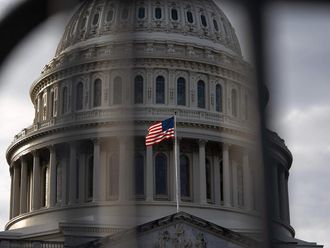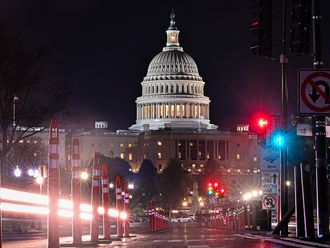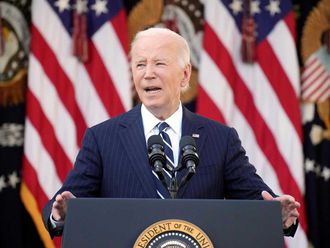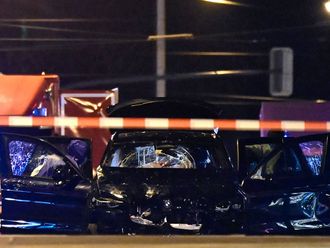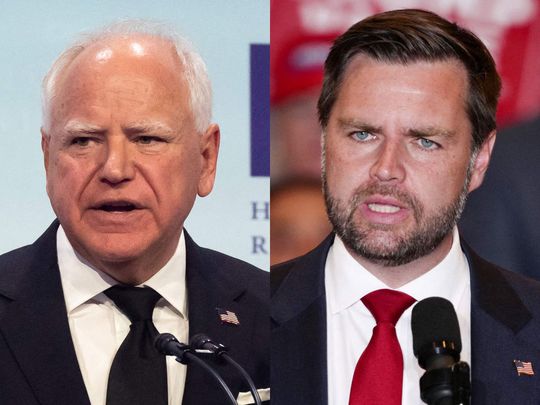
JD Vance and Tim Walz will gather for a vice presidential debate looking to frame the choice between Republican presidential nominee Donald Trump and Democratic rival Kamala Harris, five weeks before Election Day.
The two vice presidential hopefuls have taken swings at each other - Vance attacking Walz's claims about his military service, Walz mocking Vance's dismissal of powerful Democrats as "childless cat ladies" - and Tuesday's undercard matchup is expected to be similarly bruising. It's also likely to be their last high-profile chance to face off.
The matchup of vice presidential hopefuls is usually wedged between two presidential debates, but with no additional meetings between Harris and Trump confirmed, the CBS-hosted debate Tuesday night in New York may end up being the final sparring of an exceedingly tight race.
read more
- DNC 2024: Walz offers Democrats pep talk on freedom, jabs Trump with smile
- US elections: Kamala Harris picks Minnesota governor Tim Walz as running mate
- JD Vance, from Trump critic to defender and running mate; he once compared former president to Hitler
- Trump announces Ohio Senator J.D. Vance as running mate
Vance, a first-term GOP senator from Ohio, and Walz, second-term governor of Minnesota, will each aim to juice their campaign's momentum - while avoiding a misstep that would provide their opponents fodder in the final weeks before the Nov. 5 election.
"The first rule is 'do no harm,'" said Scott Mulhauser, a Democratic strategist who was on then-Vice President Joe Biden's senior team as he and Barack Obama ran for reelection in 2012.
It's a tricky balance.
"You've got to be aggressive without becoming overbearing," said Matt Paul, former chief of staff to Virginia Senator Tim Kaine when he ran alongside Hillary Clinton in 2016. "You've got to step up and find the moment without outshining the boss. And you've got to be prepared to speak to a myriad of issues - your own, your opponents' and the top of the ticket's."
The two candidates are likely to take starkly different approaches that align with their personalities.
"Tim Walz is so likable and Vance is not," said Lisa Camooso Miller, a former Republican National Committee communications director.
Vance, who has done a series of combative television interviews, will be primed to attack. He told reporters on a Republican National Committee call last week that he aims to deliver "as concise and direct an appeal to the American people as possible" contrasting Trump's and Harris' policies.
Walz is set to focus on an affirmative message as Harris plays up her pledge to be a president for "all Americans."
Either performance could very well make a difference in the trajectory of the race, said Joel Goldstein, an emeritus professor at the Saint Louis University School of Law and author of two books about the vice presidency.
After Obama struggled in his first debate of the 2012 race and drove Democrats into panic, Biden took control of the narrative with his performance against then-Representative Paul Ryan, Goldstein recalled.
"Biden sort of mocked Ryan and said their economic plans are 'malarkey' and just made fun of it," he said. "And he restored some swagger to the Democratic side that defined Obama afterward."
Republicans hope Vance, 40, can have a similar impact.
"The opportunity is there for Vance to give Trump some new momentum," said Republican strategist Matt Mackowiak, who recently hosted Vance in Austin, Texas, for a fundraiser that brought in more than $1 million. "I know he's looking at it that way. He's very ready and chomping at the bit for this opportunity."
Vance's supporters point to skills he honed at Yale Law School and in frequent Sunday show appearances that have him in the catbird seat heading into the debate. In Walz's debate prep, another ambitious 40-something Ivy Leaguer, Transportation Secretary Pete Buttigieg, has played Vance.
The former venture capitalist and bestselling author would be the youngest vice president to take the oath of office since Richard Nixon, who was sworn in just days after turning 40 in 1953. While Vance is relatively inexperienced in politics, he can tout populist bona fides as a Washington outsider.
Vance entered the race with a 27% approval rating and 40% disapproval in an Associated Press/NORC poll. His unfavorable number has kept rising, reaching 57% in early September.
"Up until now, the negatives associated with choosing Vance have been pretty well-documented," Mackowiak acknowledged. "I think the positives are accruing over time."
Walz, 60, will try to play into his affability. The former high school social studies teacher and football coach has maintained roughly the same net-positive approval rating as more Americans have gotten to know him. Earlier this month, 42% of registered voters told AP/NORC they viewed him favorably, while 32% saw him unfavorably.
Both candidates also have the chance to make a first impression with some Americans, since nearly a quarter of registered voters in the same poll said each candidate was unfamiliar.
Democrats are hoping Vance fails at one of Tuesday night's biggest challenges: satisfying Trump without overshadowing the former president's performance against Harris.
Vance has to be seen as better than Walz without outshining Trump, said Mulhauser, the Democratic strategist. "This is a high-wire act that seems likely not to land," he said.
For some Harris advisers, that would be the best outcome: that Trump will want to have the last word before Election Day and agree to a second debate with the vice president in October.


